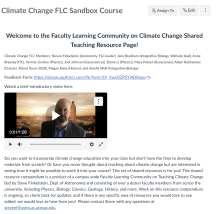Improving Scientific Literacy and Climate Change Understanding for all UT Students
In CNS we teach ~6500 non-science majors in our introductory classes each year (>2000 in Astronomy alone). These are the last science courses these students take, which presents us with an opportunity to make a lasting impression. I propose to lead a Faculty Learning Community (FLC) to design module focused on scientific literacy and the science behind climate change. This module will be based on active learning, making use of the abundance of research that shows students retain information better by doing rather than listening. The goal is to develop a customizable module that can be shared across campus, and dropped into any course (e.g., not reliant on any previous UT coursework).This module should include an emphasis on Climate Justice, which will be most effective if the FLC is diverse, so I will strive to advertise widely to reach diverse members of our faculty. The underlying rationale is that the bulk of our populace lacks a basic understanding of how the scientific method works, and how to critically examine evidence. This is exacerbated in our online world where information (good and bad) spreads quickly. By arming our students with these abilities, they will go out into the world with: an understanding of how to evaluate science when discussed in the press; a key understanding of the science behind human-caused climate change; convinced that climate change is happening now; and the knowledge that significant action can alter our course. It is my hope that with these skills these future leaders can help turn the tide of the distrust of science in our society.
Impacts from This Initiative

Teaching Climate Change (Canvas Module)
As part of Steve Finkelstein's PTF Initiative, a campus-wide faculty learning community constructed a canvas sandbox website where they could share materials related to climate change, with annotations, with the broader UT community. They collected the group's materials, and then tried to organize them in a useful way. The materials include lectures, activities, quizzes, projects, pre/post tests, etc., and are organized both by learning objective and by course. The website is now live, and a publication on pre/post survey results is being prepared.

